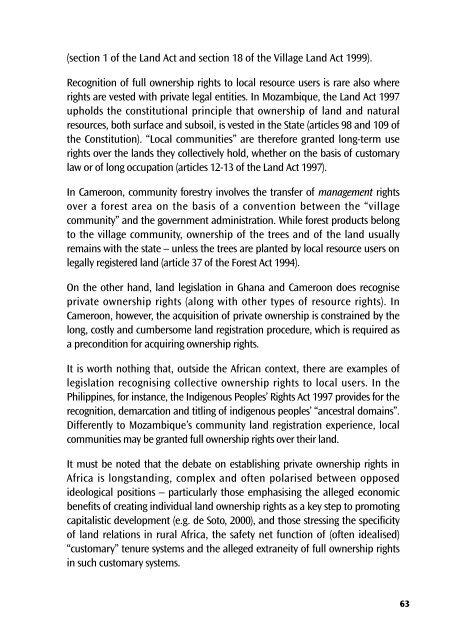Legal empowerment for local resource control
Legal empowerment for local resource control
Legal empowerment for local resource control
Create successful ePaper yourself
Turn your PDF publications into a flip-book with our unique Google optimized e-Paper software.
(section 1 of the Land Act and section 18 of the Village Land Act 1999).<br />
Recognition of full ownership rights to <strong>local</strong> <strong>resource</strong> users is rare also where<br />
rights are vested with private legal entities. In Mozambique, the Land Act 1997<br />
upholds the constitutional principle that ownership of land and natural<br />
<strong>resource</strong>s, both surface and subsoil, is vested in the State (articles 98 and 109 of<br />
the Constitution). “Local communities” are there<strong>for</strong>e granted long-term use<br />
rights over the lands they collectively hold, whether on the basis of customary<br />
law or of long occupation (articles 12-13 of the Land Act 1997).<br />
In Cameroon, community <strong>for</strong>estry involves the transfer of management rights<br />
over a <strong>for</strong>est area on the basis of a convention between the “village<br />
community” and the government administration. While <strong>for</strong>est products belong<br />
to the village community, ownership of the trees and of the land usually<br />
remains with the state – unless the trees are planted by <strong>local</strong> <strong>resource</strong> users on<br />
legally registered land (article 37 of the Forest Act 1994).<br />
On the other hand, land legislation in Ghana and Cameroon does recognise<br />
private ownership rights (along with other types of <strong>resource</strong> rights). In<br />
Cameroon, however, the acquisition of private ownership is constrained by the<br />
long, costly and cumbersome land registration procedure, which is required as<br />
a precondition <strong>for</strong> acquiring ownership rights.<br />
It is worth nothing that, outside the African context, there are examples of<br />
legislation recognising collective ownership rights to <strong>local</strong> users. In the<br />
Philippines, <strong>for</strong> instance, the Indigenous Peoples’ Rights Act 1997 provides <strong>for</strong> the<br />
recognition, demarcation and titling of indigenous peoples’ “ancestral domains”.<br />
Differently to Mozambique’s community land registration experience, <strong>local</strong><br />
communities may be granted full ownership rights over their land.<br />
It must be noted that the debate on establishing private ownership rights in<br />
Africa is longstanding, complex and often polarised between opposed<br />
ideological positions – particularly those emphasising the alleged economic<br />
benefits of creating individual land ownership rights as a key step to promoting<br />
capitalistic development (e.g. de Soto, 2000), and those stressing the specificity<br />
of land relations in rural Africa, the safety net function of (often idealised)<br />
“customary” tenure systems and the alleged extraneity of full ownership rights<br />
in such customary systems.<br />
63

















